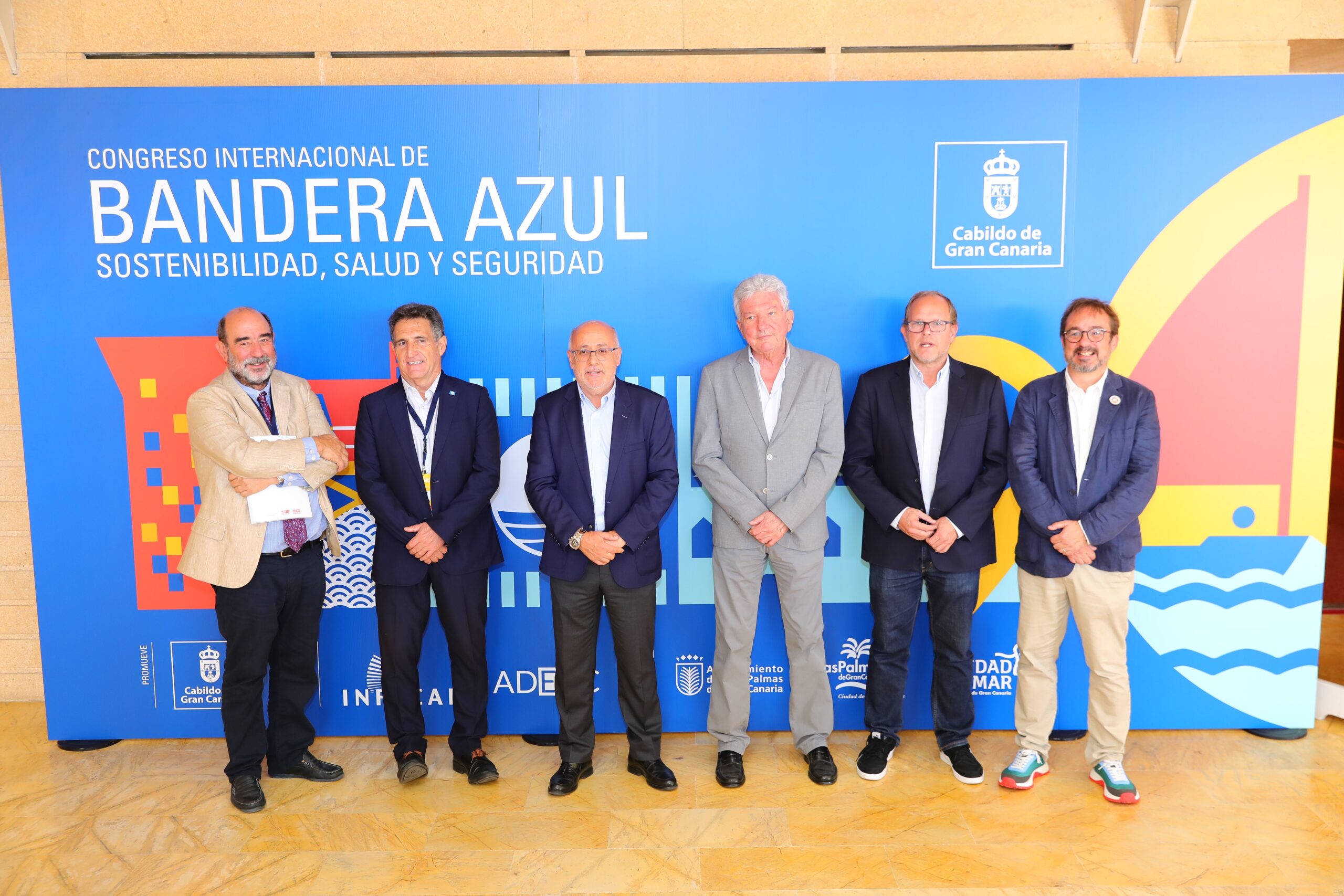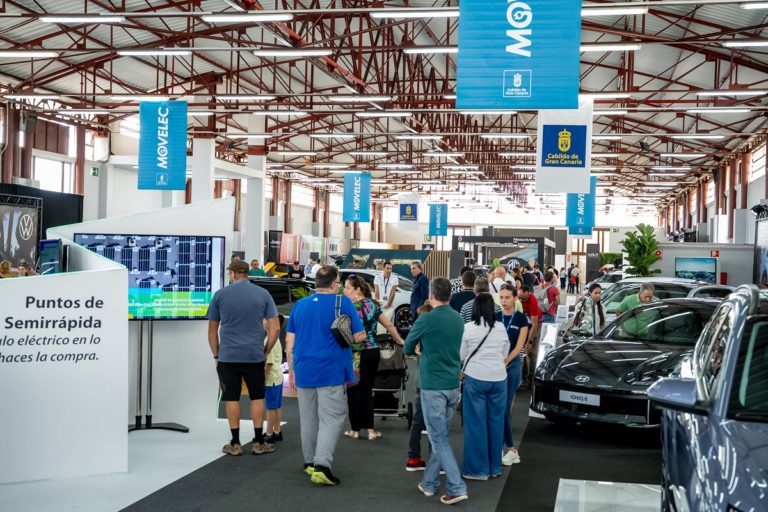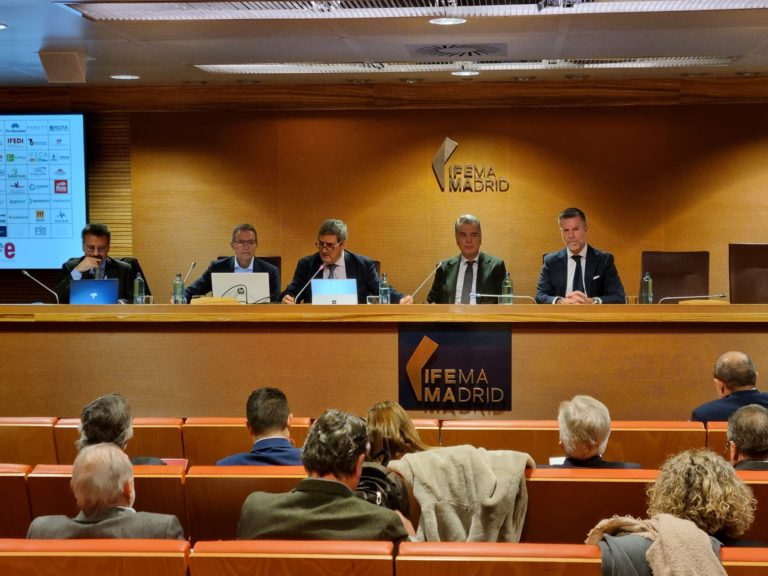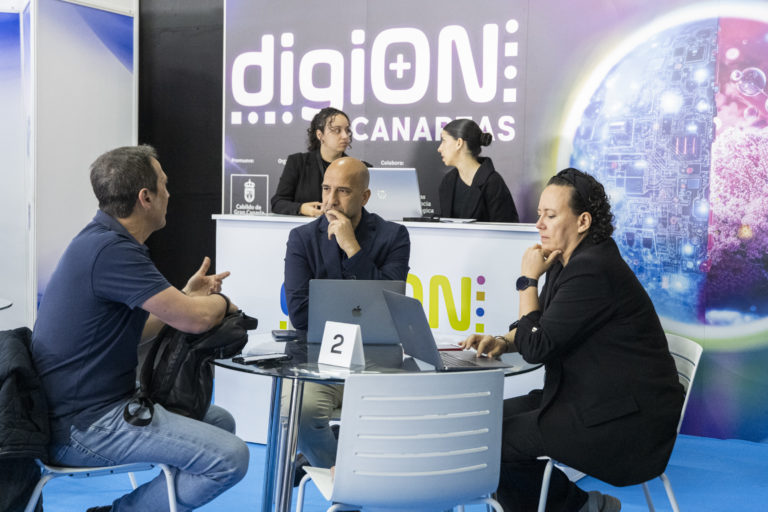- The president of the Cabildo de Gran Canaria, Antonio Morales, highlighted the relevance of the Blue Flag distinction as something “fundamental for Tourism”.
- The councilman of Tourism of Las Palmas de Gran Canaria, Pedro Quevedo, gave as an example Las Canteras as a model of “leadership in the management of our beaches”.
- The president of ADEAC, José Palacios, assured that “we will only have a future if the natural environment accompanies us: and we all have to achieve this together”.
Antonio Morales Méndez, president of the Cabildo de Gran Canaria; Pedro Quevedo Iturbe, councilman of Employment, Local Development, Tourism, Equality and Solidarity of the City Council of Las Palmas de Gran Canaria; and José Palacios Aguilar, president of the Association of Environmental and Consumer Education (ADEAC), proceeded today Wednesday, November 2, at the Institución Ferial de Canarias (Infecar), to the inauguration of the International Congress of Blue Flag. Sustainability, Health and Safety, which will be held in the same place during this day and tomorrow, November 3, and in Las Canteras Beach, on November 4.
The event, promoted by the Cabildo de Gran Canaria and co-organized by Infecar and ADEAC, has the support of the City Council of Las Palmas de Gran Canaria, through its areas of Ciudad de Mar and Tourism. The congress, which has more than 250 registered participants, brings together speakers from different autonomous communities and countries. These experts present contents endorsed by a large scientific committee, made up of 48 doctors, which guarantees the quality of the presentations that revolve around the present and future development of beaches under universal parameters of sustainability, health and safety.
The president of the Cabildo de Gran Canaria, Antonio Morales, indicated, at the opening of the event, that the island “has made great progress in the diversification of our tourist offer, although sun and beach tourism is still important. And the beaches. That is why holding this International Blue Flag Congress, on an island that today has twelve blue flags, is very important”.
Morales added that with this event “a space is generated to raise awareness of all these aspects of sustainability, health and safety for the citizens themselves. That is why we have been involved in the organization”. And he pointed out that “within the role that the Cabildo de Gran Canaria can play (beach management is a municipal competence), we are obliged to promote awareness in some sections that are ultimately a guarantee of quality of the beaches. We are talking about a symbol, the Blue Flag, recognizable everywhere, which in turn is recognized by the values guaranteed in its declaration. It is something fundamental for the Tourism”.
The Councilor for Tourism of the City Council of Las Palmas de Gran Canaria, Pedro Quevedo, commented that the celebration of a congress of these characteristics on the island and in its capital “is no small thing”, to emphasize that the organization of the Blue Flag “is a perfect example, I believe, of what public-private collaboration in a non-profit entity means”.
“For Las Palmas de Gran Canaria,” he commented, “being host we also take it as an example of our leadership in the management of our beaches. This is due to the involvement of the Cabildo de Gran Canaria, for which we are grateful. We also thank Infecar and ADEAC for their role in the organization. From the City Council, through Tourism and Ciudad de Mar, we have collaborated in this initiative”. Quevedo stressed, above all, the quality of the Playa de Las Canteras, “much more than a beach, is a binder around the city, and that meets the first requirement that we set in Tourism in the city: the positive things of the city, first for citizens and then for the tourist, who can enjoy them in this way”.
For his part, the president of ADEAC, José Palacios, highlighted the “demanding” criteria that marks Blue Flag in areas ranging from safety to cleanliness or accessibility, “to ensure a future”: Because, said Palacios, “we will only have a future if the natural environment accompanies us”.
As for the Canary Islands, he stressed that although the islands have 54 blue flags today, “they can reach one hundred in three or four years if they work along the right lines”, with the involvement of the different public administrations. “I encourage the Canary Islands, like any other community in Spain, to improve: it can be improved, always with the involvement of everyone,” he concluded.
The development of these conferences, debates and round tables will take place in two sessions (morning and afternoon) on each of the two days programmed at Infecar. In parallel, a space has been reserved at the congress for the open presentation of content, in the form of panels, posters or videos that are provided by other technical services in relation to the proper management of beaches.
This morning’s speakers included Lourdes Díaz Colón, honorary member of the FEE (Foundation for Environmental Education) and president of OPAS-Blue Flag Puerto Rico, who explained at 12:00 noon, the aspect of Blue Flag as an educational program, exposing the strategy of the organization that promotes the Blue Flag program with the Gaia 2030 horizon. Díaz Colón stressed that “in the FEE we evaluate every two years each of the integrated countries, to ensure that they meet the criteria we require: and Spain [where ADEAC is the organization responsible for Blue Flag for FEE] has always been an example”.
At 12:30 p.m., Ana Muñoz Llabres, Deputy Director General for Tourism Development and Sustainability of the Secretary of State for Tourism, gave a presentation on sustainable tourism. Muñoz described it as “fundamental” to work on the “diversification” of tourism, “firstly because the destinations themselves are asking us to do so, as they want to provide their services with quality, and that is also what tourists are asking us to do”. Thus, he stressed that “the profitability of the tourist activity already goes through the sustainability of the environment in which it is developed”.
Earlier, at 11:00 a.m., the councilman of Beaches of Telde, Jonay Lopez, proceeded with his presentation, Telde and its four blue flags: An example of success in the management of its beaches. The morning was closed with a debate with the speakers (13:00 hours). The councilman of Beaches of Telde exposed in his presentation “the example of success” in the management of the beaches of the municipality. He stressed that “we maintain a commitment to a city open to the sea”, with a strip of 24 kilometers of coastline. A space with 14 beaches: four of them have Blue Flag: Hoya del Pozo, Salinetas, La Garita and Melenara.
The mayor of Telde defended that “this is achieved with a continuous improvement in what has to do with safety, accessibility and sustainability, with new services and a necessary budget increase”.
On the afternoon of November 2, there will be up to five presentations (starting at 4:00 pm) and a final debate. Johann Durand, International Blue Flag Coordinator; José Eduardo Ramírez, Councilor for Mobility, Economic Promotion and City of the Sea of Las Palmas de Gran Canaria (with the presentation of the success story of Las Canteras, as an example of a Blue Flag beach); the top management of ADEAC; Jose Archer, president of ABAE-Blue Flag in Portugal, and Fernando Merino de Lucas, professor at the University of Murcia (with a presentation on the effects of the Blue Flag on the economy); and Luis Miguel Morant Aparisi, councilman of Tourism, Environment and Beaches of the City Council of Alfaz del Pi make up the panel of speakers in this afternoon schedule.
The program for November 3
The morning session on November 3 has a full agenda of presentations that fall under the heading of Examples of good practice in beach management, which will address issues such as lifeguard services, the updated regulation in terms of Coasts in Spain, inclusivity on the beaches, European regulations on bathing waters and its link with Blue Flag, water quality and coastal defense or drowning prevention campaigns. The interventions are scheduled from 9:00 am to 1:10 pm.
In the afternoon, from 16:00 to 19:30 hours, four large round tables will be held, on Safety and Health, New technologies applied to beach safety, Environmental Education and Inclusive Beaches.
Final day in Las Canteras
In Las Canteras, on November 4, four workshops will be held on accessibility, environmental education, the use of material resources in beach management and the use of technology in beach safety. This day of will begin at 9:00 a.m. and will conclude at 2:00 p.m., with the official closing by José Palacios, president of ADEAC.
The news of the International Blue Flag Congress can be followed at https://lpabanderaazul.com/noticias/ and through the social profiles of Bandera Azul and the complete program can be consulted on the official website of the congress, https://lpabanderaazul.com.



